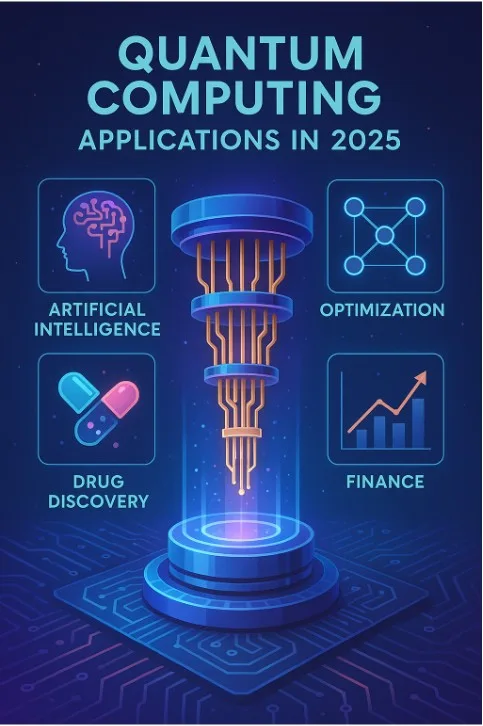quantum computing applications 2025 is no longer just a futuristic concept—it’s rapidly becoming a reality. By 2025, we can expect groundbreaking advancements that will revolutionize industries from healthcare to cybersecurity. Unlike classical computers that rely on bits (0s and 1s), quantum computers use qubits, which can exist in multiple states simultaneously thanks to superposition and entanglement. This allows them to solve complex problems exponentially faster.
In this article, we’ll explore the most promising quantum computing applications 2025, how they will impact various sectors, and what challenges remain.
1. Healthcare & Drug Discovery
One of the most exciting quantum computing applications 2025 will be in healthcare. Traditional drug discovery can take over a decade and cost billions. Quantum computers can:
-
Simulate molecular interactions at an atomic level, speeding up drug development.
-
Optimize clinical trials by analyzing vast datasets to identify ideal patient groups.
-
Personalize medicine by modeling how different drugs interact with individual genetic profiles.
Companies like IBM and Google are already working with pharmaceutical giants to accelerate drug research using quantum algorithms.
2. Financial Modeling & Risk Analysis
Banks and investment firms are investing heavily in quantum computing applications 2025 to:
-
Improve fraud detection by analyzing transaction patterns in real-time.
-
Optimize trading strategies by processing market data faster than classical systems.
-
Enhance risk assessment for loans and investments using quantum-powered simulations.
By 2025, we may see quantum algorithms helping financial institutions predict market crashes or optimize portfolios with unprecedented accuracy.
3. Cybersecurity & Encryption
Quantum computing poses both a threat and a solution for cybersecurity:
-
Breaking encryption: Quantum computers could crack current encryption methods (like RSA) in seconds.
-
Quantum-safe cryptography: New encryption standards (e.g., lattice-based cryptography) are being developed to resist quantum attacks.
-
Secure communication: Quantum key distribution (QKD) enables unhackable data transfer.
Governments and tech firms are racing to implement post-quantum cryptography before malicious actors gain access to quantum decryption.
4. Artificial Intelligence & Machine Learning
AI models require massive computational power. Quantum computing can:
-
Train neural networks faster by processing complex datasets in parallel.
-
Optimize algorithms for natural language processing (NLP) and image recognition.
-
Solve optimization problems (e.g., logistics, supply chains) more efficiently.
By 2025, we may see hybrid AI systems combining classical and quantum computing for smarter, faster decision-making.
5. Climate Modeling & Energy Optimization
Climate change is one of humanity’s biggest challenges. Quantum computing applications 2025 can help by:
-
Simulating weather patterns with higher accuracy for better disaster prediction.
-
Designing new materials for efficient solar panels and batteries.
-
Optimizing energy grids to reduce waste and improve renewable energy distribution.
Companies like Microsoft and Rigetti are exploring quantum solutions to combat climate change.
More Visit: All Topics Insights
6. Logistics & Supply Chain Optimization
Global supply chains are highly complex. Quantum computing can:
-
Optimize delivery routes to save fuel and reduce costs.
-
Predict demand fluctuations to prevent shortages or overstocking.
-
Improve warehouse automation using quantum-powered AI.
By 2025, industries like e-commerce and manufacturing could see 20-30% efficiency gains from quantum logistics solutions.
Challenges Facing Quantum computing applications 2025
Despite its potential, quantum computing still faces hurdles:
-
Error rates: Qubits are fragile and prone to decoherence.
-
Scalability: Current quantum computers have limited qubits (50-100).
-
Cost & Accessibility: Quantum systems require extreme cooling and are expensive to maintain.
However, with advancements in error correction and hybrid computing, these challenges may be overcome by 2025.
Conclusion: The Quantum Leap Ahead
The quantum computing applications 2025 will transform industries, solve previously unsolvable problems, and redefine technology as we know it. While challenges remain, the progress in healthcare, finance, cybersecurity, AI, and climate science is undeniable.
Businesses and governments must prepare for this shift by investing in quantum research and workforce training. The future of computing is quantum—and it’s arriving faster than we think.
Frequently Asked Questions (FAQs)
1. Will quantum computing replace classical computers by 2025?
No, quantum computers won’t replace classical computers anytime soon. They excel at specific tasks (like optimization and simulations) but are not suited for everyday computing. Hybrid systems (combining classical and quantum) will be the norm in 2025.
2. How will quantum computing affect cybersecurity?
Quantum computers can break traditional encryption, but they also enable unhackable quantum encryption. Governments and companies are working on post-quantum cryptography to protect data before quantum hacking becomes a real threat.
3. Which industries will benefit the most from Quantum computing applications 2025?
Healthcare (drug discovery), finance (risk modeling), cybersecurity, AI, and climate science will see the biggest impact. Logistics and energy sectors will also benefit from quantum-powered optimization.
Know More: insight
